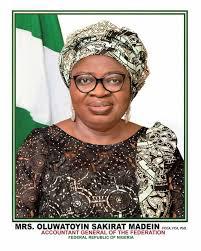$51bn foreign debt: FG rues dwindling revenue, Reps condemn needless loans, contracts
The Federal Government has voiced concern over rising public expenditures in the face of declining tax collections.
On Wednesday, the House of Representatives Committee on Finance hosted an interactive session on the 2024-2026 Medium-Term Expenditure Framework and Fiscal Strategy Paper, where Accountant General of the Federation Oluwatoyin Madein made the following statement.
On the other hand, Mrs. Madein reassured the legislators that work is being done “to stop revenue leakages and improve revenue generation.”
She claims that “revenue generation and collection are declining” because of rising costs relative to income.
The money stream into the federation, however, is being strengthened and leakages are being blocked through a number of ongoing initiatives.
Given the state of the revenue, it’s not surprising that spending has been a problem, especially given the inflationary environment of the current economy.
“The expenditures too are on the rise, and clearly the measures to enhance revenue must be worked upon on a regular basis to ensure that we are having cash to satisfy the aspirations of Nigerians.”
amp-ad width=”300″ height=”320″ Data-ad-client:ca-pub:7167863529667065 Ad-slot:3034130320 Ad-type:adsense information-auto-format=”rspv”=”” information-full-width=””>
The AGF further requested that the Committee provide her department with “all the plans, strategies, and ideas” to back up the ongoing initiatives to boost revenue creation.
Mr. Armstrong Katang, CEO of Ministry of Finance Incorporated, was also present at the lively discussion.
Speaking to reporters present, House Committee on Finance Chairman Abiodun Faleke said, “The Medium Term Expenditure Framework is the bedrock upon which the yearly budget is built, and the annual budget is the backbone upon which the Federal Government’s objectives and programmes are implemented.”
He further stated that as the representatives of the Nigerian people, MPs owe them “the onerous obligation of delivering the democratic dividends to the door steps of our voters in line with our campaign pledges.
He vowed that “value for money” will be achieved in all government contracts: “The Committee is committed to guaranteeing that.”
Oil revenues, which used to be our main source of income, have been declining over the years, which has led to a steady decline in our overall revenues. A full investigation into the cause of the oil shortages has been pledged by the committee.
However, how are our marginal field operators faring in comparison to the various oil field potentials, as stated by the NNPCL, our oil asset managers?
“How many deductions at source from oil productions are occurring owing to NNPC-signed agreements throughout the years that are now harming our revenues?
Waivers and exemptions granted to various groups continue to cost the federal government money despite these income deficiencies. The Budget Office predicts a revenue shortfall of nearly N2.7 trillion in 2024.
Similar Articles
Reps tell NDLEA to “shut down drug bunkers”
Lawmakers demand that NDLEA eliminate drug safe havens.
Feedback on repositioning FERMA to facilitate effective road rehabilitation
Only by exercising the supervision, representation, and lawmaking powers granted to us by the Constitution of the Federal Republic of Nigeria (as amended) will we be able to realise these goals. That’s what our oath of office meant at the 10th Congress’s inception, anyway.
At the very least once every three months, these meetings must be convened so that progress on the budget may be reviewed and oversight reports can be presented to the House and the people of Nigeria.
Faleke noted that the Committee “has observed various factors that have caused shortfalls in expected income and charged the Ministries, Departments, and Agencies to rise to their responsibilities in the interest of the nation” in regards to the government’s revenue shortfalls.
The Committee would not condone such laxity on the part of MDAs in not negotiating the best for the country,” he warned them.
The $11 billion P&I D debacle, in which the entire country was almost held hostage by a false deal, is still fresh in our minds.
amp-ad width=”300″ height=”320″ Data-ad-client:ca-pub:7167863529667065 Ad-slot:3034130320 Ad-type:adsense information-auto-format=”rspv”=”” information-full-width=””>
Over $30 million per month is obligated to be paid by NBET and Azura Power per another agreement signed on the government’s behalf. This arrangement is dollar-denominated and applicable even now in times of serious foreign exchange shortages.
The Committee is dedicated to maximising efficiency in all government contracts.
Representative for Lagos State’s Ikeja Federal Constituency, Ademola Olajide, bemoaned the Federal Government’s need to borrow money as a further harmful effect of low tax income.
To add insult to injury, “this ongoing borrowing due to these budget deficits has blown our debt servicing obligations to the terrible scenario where last year (2022), we spent over 95 percent of our income on debt servicing,” he said.
According to documents detailing the budget’s implementation, the total budgetary resources available to the Federal Government in 2021 and 2022 amounted to N10.51 trillion. Total recurring expenditures were N19.37tn, while capital expenditures were N3.79tn. In total, N24.47tn was spent on the budget during the years, for a fiscal deficit of N13.95tn.
The Federal Government forecasts that it would collect N8.63 trillion in revenue in 2023. The budget calls for N13.30tn in ongoing expenses and N3.37tn in capital improvements. The Federal Government has planned a budget of N17.64 trillion for the year. The government estimates that N9.01 trillion will be needed to cover the gap. It had spent N4.41 trillion, earned N2.16 trillion, and borrowed N2.20 trillion by the end of the first quarter.
President Bola Tinubu has asked the Senate to approve his plan to borrow an additional $7.8 billion and €100 million from foreign lenders between 2022 and 2024, bringing Nigeria’s total external debt to an estimated $51 billion.




